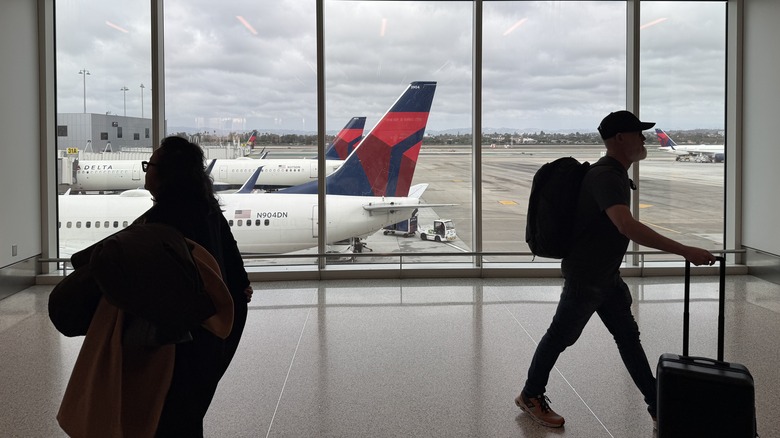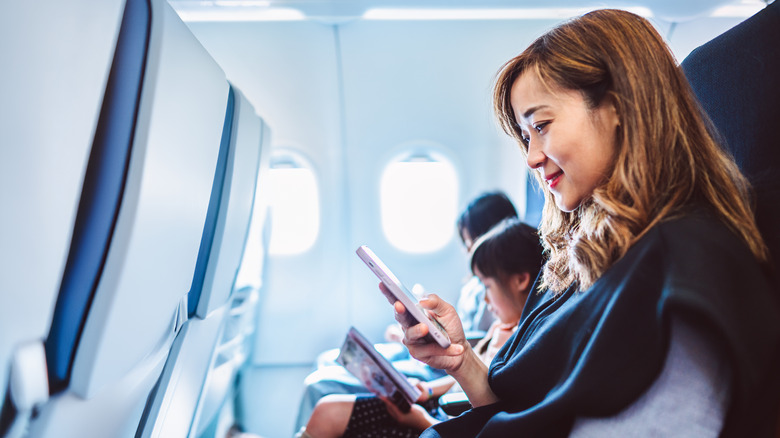This Popular US Airline's Innovative Use Of AI Tools May Come At A Cost For Travelers
It is no great revelation to say that artificial intelligence (AI) has revolutionized almost every aspect of society. For all intents and purposes, the world is just witnessing the infancy of this mighty technological breakthrough — for better or worse. Travel is no exception, with airlines rushing to harness the potential that AI can bring, including Delta Air Lines with its AI-powered Concierge Service.
In January 2025, Delta announced the roll out of a digital tool that promises to help users plan their trips from A to Z. Need a hotel? Check. Book a rideshare from the airport to your vacation rental? Check. Don't remember when your passport expires? Delta Concierge will remind you. Delta's CEO Ed Bastian, said in a statement that Delta Concierge "will serve as an AI-powered personal assistant that combines the context of who our customers are and how they like to travel, with the deep knowledge and insights we've built as the world's most reliable airline."
One of the most common questions about Delta now is: How far does AI go? Many of us have experienced the price of flights changing depending on the day and time you book — sometimes, airline prices will change within hours. Flight booking myths aside, airlines like Delta are starting to experiment with AI determining the price of your flight. Delta executives said in an earnings call in July that the airline is using its generative AI decision-making engine to price about 3% of domestic flights, and that the company is aiming to grow this figure to 20% by the end of the year. This information sent a ripple of concern throughout the industry, to the point that it triggered a series of questions from U.S. Senators about how the airline is using AI to determine the price of your ticket. One of the biggest questions is: Will this make flights more expensive?
Delta's use of AI can increase convenience but at what cost?
While innovation often increases convenience, it also raises questions about privacy and fairness. Imagine boarding your flight for Thanksgiving and finding out that your seatmate paid about half the price. It seems unfair, but actually dynamic pricing is not new. According to the International Air Travel Association (IATA), the practice goes back to the '80s. In a nutshell, the airline analyzes variables in real time in order to maximize revenue, depending on the date of travel, demand, and the number of seats remaining, among other factors. The incorporation of AI into the mix is now supercharging this capability.
AI isn't going anywhere — and when used thoughtfully, it can make air travel safer and more efficient. But if you ever checked the price of a flight and then went back in later to buy it only to find that the price had changed, you are not alone. What may have happened behind the scenes is that the airline detected a subtle surge in demand and adjusted the pricing accordingly. This can work to the advantage of the savvy traveler who is booking at off-peak times or leveraging price-drops. But to the average user, it can feel confusing and unpredictable.
One of the biggest concerns with AI pricing is the potential for hidden bias — in other words, that it will estimate how much you, as an individual, are willing to pay. In its response to the questions posed by U.S. Senators, Delta said that prices are not targeted to individual consumers and that it has a zero tolerance policy on "discriminatory or predatory pricing." The statement added that customers can compare prices without the need to provide personal information. For example: Customers will not need to login to view or compare prices.
How to check that AI is not costing more for the same flight
Delta's experiments with AI are just the beginning. As the technology evolves, we could see even more personalized (and potentially intrusive) applications, not just on Delta but on other airlines as well. While it may seem all a bit overwhelming, there are steps you can take to beat the system and find the most budget-friendly flights. For one, opt out of unnecessary data sharing where possible to protect a modicum of privacy.
A popular hack is to use a VPN when comparing prices. If you don't have a VPN when you are researching your next adventure, Allan Wright, founder of Zephyr Adventures, recommends that you look up your trip on an independent travel site to start, like Expedia or Orbitz. Then, check the same flight on Delta's website on the same browser that you use everyday. Finally, go on to check the airline's website again, but this time from another browser where you have disabled cookies. When he tested this system, Wright said he was given different price results for the same trip.
Giving up some of your private details is the price that travelers pay for convenience. To function effectively, services like Delta's AI-powered Concierge relies on vast amounts of personal data, such as your travel history and spending habits. In exchange, you get something of a 24/7 virtual travel assistant, not only for planning, but also to handle any unexpected hiccups along the way. No more waiting on hold when your flight gets delayed making you miss your connection and need to quickly find an alternative route. After all, it is in the airline's best interest to retain consumer trust and make sure that travelers don't feel as if they have sacrificed customer care to the altar of technology.


